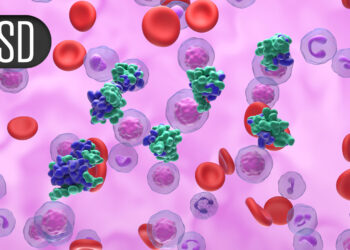A head-to-head comparison of the JAK inhibitor drug tofacitinib and chimeric monoclonal antibody infliximab in the treatment of acute severe ulcerative colitis (ASUC) shows that, contrary to concerns, tofacitinib is not associated with worse postoperative complications and in fact may reduce the risk of the need for colectomy.
“Tofacitinib has shown efficacy in managing ASUC, but concerns about postoperative complications have limited its adoption,” reported the authors in research published in Clinical Gastroenterology and Hepatology.
“This study shows that tofacitinib is safe and doesn’t impair wound healing or lead to more infections if the patient needs an urgent colectomy, which is unfortunately common in this population,” senior author Jeffrey A. Berinstein, MD, of the Division of Gastroenterology and Hepatology, Michigan Medicine, Ann Arbor, Michigan, told Medscape Medical News.
Recent treatment advances for UC have provided significant benefits in reducing the severity of symptoms; however, about a quarter of patients go on to experience flares, with fecal urgency, rectal bleeding, and severe abdominal pain of ASUC potentially requiring hospitalization.
The standard of care for those patients is rapid induction with intravenous (IV) corticosteroids; however, up to 30% of patients don’t respond to those interventions, and even with subsequent treatment of cyclosporine and infliximab helping to reduce the risk for an urgent colectomy, patients often don’t respond, and ultimately, up to a third of patients with ASUC end up having to receive a colectomy.
While JAK inhibitor therapies, including tofacitinib and upadacitinib, have recently emerged as potentially important treatment options in such cases, showing reductions in the risk for colectomy, concerns about the drugs’ downstream biologic effects have given many clinicians reservations about their use.
“Anecdotally, gastroenterologists and surgeons have expressed concern about JAK inhibitors leading to poor wound healing, as well as increasing both intraoperative and postoperative complications, despite limited data to support these claims,” the authors wrote.
To better understand those possible risks, first author Charlotte Larson, MD, of the Department of Internal Medicine, Michigan Medicine, and colleagues conducted a multicenter, retrospective, case-control study of 109 patients hospitalized with ASUC at two centers in the US and 14 in France.
Of the patients, 41 were treated with tofacitinib and 68 with infliximab prior to colectomy.
Among patients treated with tofacitinib, five (12.2%) received infliximab and four (9.8%) received cyclosporine rescue immediately prior to receiving tofacitinib during the index admission. In the infliximab group, one (1.5%) received rescue cyclosporine.
In a univariate analysis, the tofacitinib-treated patients showed significantly lower overall rates of postoperative complications than infliximab-treated patients (31.7% vs 64.7%; odds ratio [OR], 0.33; P = .006).
The tofacitinib-treated group also had lower rates of serious postoperative complications (12% vs 28.9; OR, 0.20; P = .016).
After adjusting for multivariate factors including age, inflammatory burden, nutrition status, 90-day cumulative corticosteroid exposure and open surgery, there was a trend favoring tofacitinib but no statistically significant difference between the two treatments in terms of serious postoperative complications (P = .061).
However, a significantly lower rate of overall postoperative complications with tofacitinib was observed after the adjustment (odds ratio, 0.38; P = .023).
Importantly, a subanalysis showed that the 63.4% of tofacitinib-treated patients receiving the standard FDA-approved induction dose of 10 mg twice daily did indeed have significantly lower rates than infliximab-treated patients in terms of serious postoperative complications (OR, .10; P = .031), as well as overall postoperative complications (OR, 0.23; P = .003), whereas neither of the outcomes were significantly improved among the 36.6% of patients who received the higher-intensity thrice-daily tofacitinib dose (P = .3 and P = .4, respectively).
Further complicating the matter, in a previous case-control study that the research team conducted, it was the off-label, 10 mg thrice-daily dose of tofacitinib that performed favorably and was associated with a significantly lower risk for colectomy than the twice-daily dose (hazard ratio 0.28; P = .018); the twice-daily dose was not protective.
Berinstein added that a hypothesis for the benefits overall, with either dose, is that tofacitinib’s anti-inflammatory properties are key.
“We believe that lowering inflammation as much as possible, with the colon less inflamed, could be providing the benefit in lowering complications rate in surgery,” he explained.
Regarding the dosing, “it’s a careful trade-off,” Berinstein added. “Obviously, we want to avoid the need for a colectomy in the first place, as it is a life-changing surgery, but we don’t want to increase the risk of infections.”
In other findings, the tofacitinib group had no increased risk for postoperative venous thrombotic embolisms (VTEs), which is important as tofacitinib exposure has previously been associated with an increased risk for VTEs independent of other prothrombotic factors common to patients with ASUC, including decreased ambulation, active inflammation, corticosteroid use, and major colorectal surgery.
“This observed absence of an increased VTE risk may alleviate some of the hypothetical postoperative safety concern attributed to JAK inhibitor therapy in this high-risk population,” the authors wrote.
Overall, the results underscore that “providers should feel comfortable using this medication if they need it and if they think it’s most likely to help their patients avoid colectomy,” Berinstein said.
“They should not give pause over concerns of postoperative complications because we didn’t show that,” he said.
Commenting on the study, Joseph D. Feuerstein, MD, of the Department of Medicine and Division of Gastroenterology, Beth Israel Deaconess Medical Center, Harvard Medical School, Boston, noted that, in general, in patients with ASUC who fail on IV steroids, “the main treatments are infliximab, cyclosporine, or a JAK inhibitor like tofacitinib or upadacitinib, [and] knowing that if someone needs surgery, the complication rates are similar and that pre-operative use is okay is reassuring.”
Regarding the protective effect observed with some circumstances, “I don’t put too much weight into that,” he noted. “[One] could speculate that it is somehow related to faster half-life of the drug, and it might not sit around as long,” he said.
Feuerstein added that “the study design being retrospective is a limitation, but this is the best data we have to date.”
Berinstein and Feuerstein had no disclosures to report.
Source link : https://www.medscape.com/viewarticle/does-tofacitinib-worsen-postoperative-complications-acute-2025a1000ieb?src=rss
Author :
Publish date : 2025-07-11 11:12:00
Copyright for syndicated content belongs to the linked Source.









